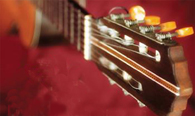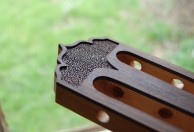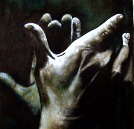Welcome to one of the most active flamenco sites on the Internet. Guests can read most posts but if you want to participate click here to register.
This site is dedicated to the memory of Paco de Lucía, Ron Mitchell, Guy Williams, Linda Elvira, Philip John Lee, Craig Eros, Ben Woods, David Serva and Tom Blackshear who went ahead of us.
We receive 12,200 visitors a month from 200 countries and 1.7 million page impressions a year. To advertise on this site please contact us.
|

|
|
RE: Music theory is way too complicated
|
You are logged in as Guest
|
|
Users viewing this topic: none
|
|
Login  | |
|

  
turnermoran
Posts: 391
Joined: Feb. 6 2010

|
 RE: Music theory is way too complicated (in reply to Munin) RE: Music theory is way too complicated (in reply to Munin)
|
|
|
I wouldn't call myself a "guru", but...
I can recommend some things to think about before spending time and money getting into studying theory:
1) the more fluent you are at reading music, the better. It's very hard to find a good method isn't based on music notation. None that I can think of. You don't have to be good at reading music on guitar, but that helps. But the main skill you need is reading the notes on paper.
2) you should probably work with a teacher. Maybe as minimally as a once-in-a-while lesson, or more if you can. That will help.
3) related to #2, you should probably focus on one of 2 main avenues in theory, and find a teacher well versed in the one you want to pursue. Those theories are classical vs. contemporary. They both accomplish similar things, but use different terminology and systems of analysis.
Clues as to which is which:
"figured bass", "neopolitean 6ths" "species counterpoint" = classical
"altered dominants" "bebop scales" "ii-V-I progressions" = contemporary/jazz (although most of that stuff can be expressed in classical as well)
Personally, I recommend going with contemporary theory. Having taken both, I have never used "species counterpoint", "figured bass", or many of the other things in classical theory in my discussions and dealings with other musicians as a professional musician myself. Although..I'm not a classical guitarist per se. Or at least, the type that only plays classical.. Maybe classical musicians strictly speak 'classical theory'.
I wouldn't know
|
|
|
|
REPORT THIS POST AS INAPPROPRIATE |
Date Nov. 19 2010 2:29:14
 |
|

   
coreydefresno
Posts: 68
Joined: Nov. 5 2010

|
 RE: Music theory is way too complicated (in reply to Guest) RE: Music theory is way too complicated (in reply to Guest)
|
|
|
quote:
4) Flamenco has not existed for that long. All important flamencologists/musicologists agree. First, again to Planeta. His seguiriya is the first that we know of. Guess what. We do not know the melody. We know he strummed an intro and then sang but as far as we know he did not accompany himself. If he is the earliest flamenco, and we do not have empirical evidence for a melody or actual seguiriya accompaniment, then how is he flamenco?
Many of the leading scholars (Hurtado Cortes; Caballero; Gamboa) are all begining to speak of preflamenco/protoflamenco/flamenco.
Preflamenco would be 16th to 18th century. Protoflamenco would be people like Planeta who have enough characteristics to say a music is emerging. And flamenco would be Los Cagancho, Joaquin de la Paula, El Fillo, Silverios, Don Antonio, who if you look at their dates, are mid to late 19th century.
Dear Romerito,
This statement is from the Andalucian government that due to political correctness, and proper Andalucian manner, does not refer to any Iberian-Arabs as gypsies, but in fact, amongst themselves, the gitanos who for example own the shops around the Mezquita, do not like people calling them 'gypsies" because of the negative connotations from the past and because of the association of them with the typical Romany street gypsies that beg and read fortunes at the Puerta del Perdon.
Here is the official, Andalucian government version of the history of flamenco where they clearly state that flamenco has been documented for 200 years or so, but they say that it began when the Indians came in 1425 and fused their music and life with the Arabs and Jews in the rugged mountains of Andalucia. They clearly say that this was the beginning of Flamenco.
Also there are many writers as early as 1770 that documented the widespread popularity of flamenco within the entire population of Andalucia, and the countless flamenco shows that were documented. Since it was widely popular at the first documentation of the Art, does it not stand to reason that it took many decades, and centuries for it to evolve to be a widely popular folkloric art? Does it stand to reason that if it were not written that it did not exist, knowing all else that we know about Andalucian culture and history? They preserved the Hellenic traditions, and the Hellenic traditions brought in 800 developed throughout Andalucia and merged with Romani culture: Did they not influence the Romani's, and shape flamenco? Were the Arabs not the most advanced and civilized culture of their time? Did they not plant the seed, in 800 A.D.? I have more to say, but I want you read and consider this first before you emphatically state that flamenco started with El Planeta and is only 200 years old.
"Flamenco history has only been documented for the past two hundred years or so, and anything before this time is open to debate and speculation.
Much of what we know from before this time comes from stories and legends that have been passed down through family dynasties, in a similar way to the flamenco song itself.
One thing we can be sure of is that flamenco in its original form was only voice, a primitive cry or chant accompanied only by the rhythm which would be beaten out on the floor by a wooden staff or cane.
These styles are known as Palo Secos, or dry styles, and they are the oldest forms of song known today. The Toñas are the family of songs which represent these style and they include the toña, one of the oldest known styles, the martinetes, which are the songs of the blacksmiths, the rhythm being supplied by the hammer beating on the anvil, the carceleras or prison songs, and the debla, which at one time was thought to have had connections with a gypsy religious rite."
"Many believe flamenco to be the invention of the gypsies, and although they have been the main protagonists of the art, they are not its sole creators.
Flamenco song can be broken down into two categories- Cante gitano, gypsy songs, and Cante andaluz, andalucian songs.
When the gypsies arrived in Andalucia from India around 1425, they brought with them many song and dance styles that have strong Indian connections. At this time Andalucía was still under Arab rule, and along with the Jews and the moors, the gypsies were soon to be persecuted by the Catholic monarchs and the inquisition.
The moors were forced to convert to Christianity, and failure to do so resulted in expulsion from Spain, the Jews suffered a similar fate, and the gypsies were subjected to some of the worst atrocities in an attempt to exterminate them as a race. Many laws were passed by various monarchs, which forbid them anything to do with their identity.
They were to stop wearing their style of dress, cease speaking in the Romany language, and to stop their wanderings and seek steady employment, which prohibited them obtaining money by the usual gypsy traits like horse dealing, trading at fairs, and sorcery.
These laws and restrictions resulted in bands of gypsies, moors, and Jews taking refuge in treacherous mountainous areas, which were too desolate for the authorities to pursue them.
These different cultures lived in relative harmony for many years, and the fusion of their music and dances are what we know today as flamenco.
In the eighteenth century attitude towards the gypsies changed considerably,which resulted in numerous bands of gypsies descending on the small villages and towns, bringing with them their exciting, seductive music- flamenco.
At first this music was not considered worthy of attention, and flamenco was only performed in the homes and private get together of the gypsies. Their mysterious music and stimulating dances were soon to catch the attention of the romantic writers of the eighteenth and nineteenth centuries."
Saludos,
Corey
|
|
|
|
REPORT THIS POST AS INAPPROPRIATE |
Date Nov. 19 2010 2:43:06
 |
|

   
Andy Culpepper
Posts: 3023
Joined: Mar. 30 2009
From: NY, USA

|
 RE: Music theory is way too complicated (in reply to turnermoran) RE: Music theory is way too complicated (in reply to turnermoran)
|
|
|
Best place to start is learn your intervals. Once you know intervals there is no chord or scale that you can't tackle or figure out.
Start on the E string and memorize what fret is what interval up from the E, and memorize the sound or color that you get from each.
E-F minor second, E-F# major second, E-G minor third, E-G# major third etc.
Then start looking at triads - 3 note chords
The outline of the major or minor triad is the root note and the fifth: E to B for example. The third in between the root note and the fifth is what determines if the chord is major or minor. Major third = E-G#-B = major chord. Minor third = E-G-B = minor chord.
Try to build these major and minor triads off of any note anywhere on the fretboard.
Also study scales and modes (starting + ending the scale on different notes)
Also keys, how many sharps and flats are in each key, the circle of fifths, parallel major/minor etc. Build your triads off of each note in a scale, and if you use only notes that are in that scale, you will get some major, some minor, and one diminished chord. Those are the chords that make up the "key". Study how each one functions harmonically and where it wants to go. Later on you can start adding extensions like 7ths 9ths sus4 add2 etc. That's most of what you need in Flamenco right there....
_____________________________
Andy Culpepper, luthier
http://www.andyculpepper.com
|
|
|
|
REPORT THIS POST AS INAPPROPRIATE |
Date Nov. 19 2010 2:52:37
 |
|

  
turnermoran
Posts: 391
Joined: Feb. 6 2010

|
 RE: Music theory is way too complicated (in reply to Andy Culpepper) RE: Music theory is way too complicated (in reply to Andy Culpepper)
|
|
|
I wasn't going to get into specifics, but reading deteresa1's post, I thought I might offer up a different but related track, and it's the track I took having grown up playing rock music.
1) get a handle on maj keys. namely the chords in each major key. I maj, ii min, iii min, IV maj, V maj (often V7), vi min, vii diminished.
2) familiarize yourself with I-IV-V-I chord prgressions. Then include other chords. Reseach "common chord progressions" (I-vi-IV-V....I-vi-ii-V, etc).
3) sticking with major key stuff, try improvising with a major scale. which one? when you can identify a bunch of chords as all coming from one key - say C major - then use C maj scale to improvise. Do this for all 12 keys. This is "diatonic harmony": the idea that a series of chords can be traced to one scale. And that scale can be used on those chords.
4) get into minor keys. start with the "relative minor". That's where you move the tonal center to one of the minor chords found in the major chord - the 6th chord in fact. That yields a I-IV-V progression that is entirely minor. i min, iv min, v min.
5) the scale you use to improvise is the same as the major key from where you took all this stuff. It's the "natural minor scale". The other available chords are also the same as in the major key.
6) now change the v min chord to a V maj (or better yet: V7 chord). When you improvise, you have to change the chord for that one chord. It requires a harmonic minor scale. If you are in the Am tonal center, and the V7 is E7, you use the A harmonic minor scale. (There are other scale choices, but this is the common starter scale)
7) This gets you into "non-diatonic" harmony - the idea that not all chords use the same scale.
From here it's rabbit hole time!
Because once you are comfortable changing scales for the brief time you have the E7 for, you'll get a feel for how tricky that can be..at first. Once you get used to it, all the business about chord intervals, other scales, and more complicated stuff will be a matter of learning new things, one by one.
But in terms of *applying* theory, I think that's the quickest way to use something that happens all the time.
And since flamenco uses this so much, it's important to know. In other words, the Am - G - F - E7 "phrygian" (or "andalucian" or whatever you call it) is a case in point example of "non-diatonic harmony". The first 3 chords can be traced to one scale, but the E7 uses another.
That's the way I got into harmony. I'm sure others have other suggestions. One thing though: I think a linear method isn't always effective. sometimes it's very circular, where you learn things at strange times, and out of order, and have to make sense of it with whatever you have at your disposal at that time. As time goes on, you'll put it all together
|
|
|
|
REPORT THIS POST AS INAPPROPRIATE |
Date Nov. 19 2010 3:47:08
 |
|
 New Messages New Messages |
 No New Messages No New Messages |
 Hot Topic w/ New Messages Hot Topic w/ New Messages |
 Hot Topic w/o New Messages Hot Topic w/o New Messages |
 Locked w/ New Messages Locked w/ New Messages |
 Locked w/o New Messages Locked w/o New Messages |
|
 Post New Thread
Post New Thread
 Reply to Message
Reply to Message
 Post New Poll
Post New Poll
 Submit Vote
Submit Vote
 Delete My Own Post
Delete My Own Post
 Delete My Own Thread
Delete My Own Thread
 Rate Posts
Rate Posts
|
|
|
Forum Software powered by ASP Playground Advanced Edition 2.0.5
Copyright © 2000 - 2003 ASPPlayground.NET |
0.09375 secs.
|


 Printable Version
Printable Version










 New Messages
New Messages No New Messages
No New Messages Hot Topic w/ New Messages
Hot Topic w/ New Messages Hot Topic w/o New Messages
Hot Topic w/o New Messages Locked w/ New Messages
Locked w/ New Messages Locked w/o New Messages
Locked w/o New Messages Post New Thread
Post New Thread